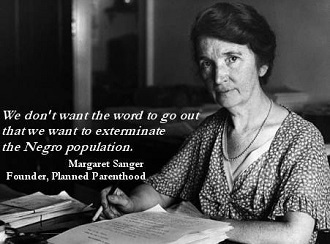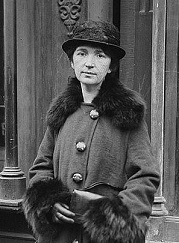Margaret Sanger, racist eugenicist extraordinaire
Arina Grossu
Arina Grossu is Director, Center for Human Dignity at Family Research Council. This article appeared in The Washington Times on May 5, 2014.
Recent articles have reported on an unearthed video from 1947 of Margaret Sanger demanding "no more babies" for 10 years in developing countries. A couple of years ago, Margaret Sanger was named one of Time magazine's "20 Most Influential Americans of All Time." Given her enduring influence, it's worth considering what the woman who founded Planned Parenthood contributed to the eugenics movement.
Sanger shaped the eugenics movement in America and beyond in the 1930s and 1940s. Her views and those of her peers in the movement contributed to compulsory sterilization laws in 30 U.S. states that resulted in more than 60,000 sterilizations of vulnerable people, including people she considered "feeble-minded," "idiots" and "morons."
She even presented at a Ku Klux Klan rally in 1926 in Silver Lake, N.J. She recounted this event in her autobiography:
💬 "I accepted an invitation to talk to the women's branch of the Ku Klux Klan ... I saw through the door dim figures parading with banners and illuminated crosses ... I was escorted to the platform, was introduced, and began to speak ... In the end, through simple illustrations I believed I had accomplished my purpose. A dozen invitations to speak to similar groups were proffered" (Margaret Sanger, "An Autobiography," Page 366).
That she generated enthusiasm among some of America's leading racists says something about the content and tone of her remarks. In a letter to Clarence Gable in 1939, Sanger wrote:
💬 "We do not want word to go out that we want to exterminate the Negro population, and the minister is the man who can straighten out that idea if it ever occurs to any of their more rebellious members" (Margaret Sanger commenting on the 'Negro Project' in a letter to Gamble, Dec. 10, 1939).
Her own words and television appearances leave no room for parsing. For example, she wrote many articles about eugenics in the journal she founded in 1917, the Birth Control Review. Her articles included "Some Moral Aspects of Eugenics" (June 1920), "The Eugenic Conscience" (February 1921), "The Purpose of Eugenics" (December 1924), "Birth Control and Positive Eugenics" (July 1925) and "Birth Control: The True Eugenics" (August 1928), to name a few.
The following are some of her more telling quotes:
💬 "While I personally believe in the sterilization of the feeble-minded, the insane and syphilitic, I have not been able to discover that these measures are more than superficial deterrents when applied to the constantly growing stream of the unfit. They are excellent means of meeting a certain phase of the situation, but I believe in regard to these, as in regard to other eugenic means, that they do not go to the bottom of the matter." ("Birth Control and Racial Betterment," Feb. 1919, The Birth Control Review).
💬 "Eugenics without birth control seems to us a house builded upon the sands. It is at the mercy of the rising stream of the unfit" ("Birth Control and Racial Betterment," Feb. 1919, The Birth Control Review).
💬 "Stop our national habit of human waste." ("Woman and the New Race," 1920, Chapter 6).
💬 "By all means, there should be no children when either mother or father suffers from such diseases as tuberculosis, gonorrhea, syphilis, cancer, epilepsy, insanity, drunkenness and mental disorders. In the case of the mother, heart disease, kidney trouble and pelvic deformities are also a serious bar to childbearing No more children should be born when the parents, though healthy themselves, find that their children are physically or mentally defective." ("Woman and the New Race," 1920, Chapter 7).
💬 "The main objects of the Population Congress would be to apply a stern and rigid policy of sterilization and segregation to that grade of population whose progeny is tainted, or whose inheritance is such that objectionable traits may be transmitted to offspring[;] to give certain dysgenic groups in our population their choice of segregation or sterilization." ("A Plan for Peace," 1932).
In a 1957 interview with Mike Wallace, Sanger revealed:
💬 "I think the greatest sin in the world is bringing children into the world - that have disease from their parents, that have no chance in the world to be a human being practically. Delinquents, prisoners, all sorts of things just marked when they're born. That to me is the greatest sin - that people can - can commit."
This line of thinking from its founder has left lasting marks on the legacy of Planned Parenthood. For example, 79 percent of Planned Parenthood's surgical abortion facilities are located within walking distance of black or Hispanic communities.
The Centers for Disease Control and Prevention's Abortion Surveillance report revealed that between 2007 and 2010, nearly 36 percent of all abortions in the United States were performed on black children, even though black Americans make up only 13 percent of our population.
A further 21 percent of abortions were performed on Hispanics, and 7 percent more on other minority groups, for a total of 64 percent of U.S. abortions tragically performed on minority groups. Margaret Sanger would have been proud of the effects of her legacy.
____________________________________________________________________________________________
Source: Family Research Council. IMG: © N/A. AWIP: http://www.a-w-i-p.com/index.php/aJ4J


























